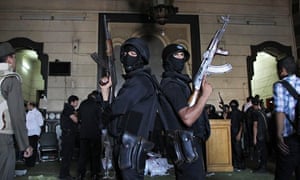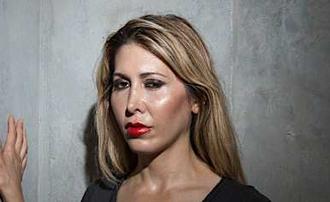Attention is focusing on British-made weapons being sent to Moscow, and understandably so. Vladimir Putin was once a friend of Britain, given cover by Tony Blair as he razed Chechnya to the ground, but now – in the typically Orwellian manner of British foreign policy – he has been transformed into enemy number one. And yet David Cameron's definitive claims that an absolute arms embargo has been put in place against Russia have been torpedoed: according to a cross-party group of MPs, there are more than 200 licences in place to sell arms to Putin's government.
If you have even a shaky belief in British foreign policy as a force for democracy, even a cursory glance at the list of destinations for British arms should swiftly lead you to part with your illusions. Israel has now killed close to 600 people in Gaza, including 149 children; its land-grabbing settlements place it in violation of international law. Other countries might be deemed pariah states for such actions, but not Israel, which Britain has supplied with parts for sniper rifles, military aircraft, unmanned drones and small arms.
Saudi Arabia is one of the most repressive regimes on earth and bans political parties, trade unions and all forms of dissent; deprives women of many of their most basic rights; kills "witches"; has recently declared atheists to be terrorists; and persecutes LGBT people. It should surely be an ostracised regime. And yet this is the biggest market for British arms, with our government approving £1.6bn worth of exports, ranging from equipment for machine guns to "components for military equipment for initiating explosives."
Bahrain's dictatorship doesn't just have Saudi Arabia's totalitarian despots to help defend it from democratic protesters; Britain's own arms sales to the regime are a crucial display of solidarity.
Egypt's junta has killed hundreds of protesters, sentenced many more to death and imprisoned journalists. And yet it is the proud recipient of British arms ranging from assault rifles to components for military aircraft.
The killing fields of Sri Lanka have received all too little attention in the British media, with up to 70,000 Tamil civilians massacred at the end of the 2009 civil war: but this does not serve as a deterrent for British arms sellers.
According to the British MPs, new Labour awarded five export licences to Syria for chemicals that could be used for weapons. They call it a "highly questionable" decision. I would say so.
We sold Muammar Gaddafi weapons, both before 1985 and then again when Blair befriended him, even signing a defence co-operation agreement in 2007. When British leftwingers like the Labour MP Jeremy Corbyn were lonely voices against Saddam Hussein's murderous regime in the 1980s, our government was happily flogging it weapons.
This dictator-arming industry is heavily propped up by our government; while other industries were told to sink-or-swim with disastrous consequences, each defence export job in Britain receives a de facto £13,000 subsidy. But Britain has a shortage of engineers. Instead of promoting an industry that arms murderers and torturers, we should surely be promoting the renewable energies of the future and reskilling army industry workers to help save the planet.
In the meantime, our arms trade serves as a reminder that Britain's claim to be a promoter of democracy is a myth. As long as it is promoted and sanctioned by the government, our country will remain the trusted ally and friend of tyrants. Doesn't it make you proud to be British?
Since you’re here …
… we have a small favour to ask. More people are reading the Guardian than ever but advertising revenues across the media are falling fast. And unlike many news organisations, we haven’t put up a paywall – we want to keep our journalism as open as we can. So you can see why we need to ask for your help. The Guardian’s independent, investigative journalism takes a lot of time, money and hard work to produce. But we do it because we believe our perspective matters – because it might well be your perspective, too.
I appreciate there not being a paywall: it is more democratic for the media to be available for all and not a commodity to be purchased by a few. I’m happy to make a contribution so others with less means still have access to information.Thomasine F-R.
If everyone who reads our reporting, who likes it, helps fund it, our future would be much more secure. For as little as $1, you can support the Guardian – and it only takes a minute. Thank you.








No comments:
Post a Comment
Note: Only a member of this blog may post a comment.